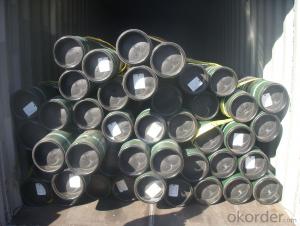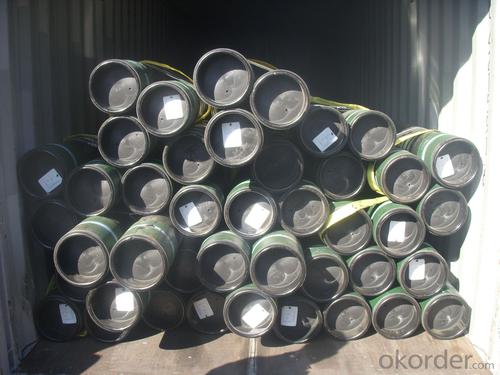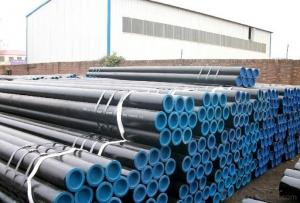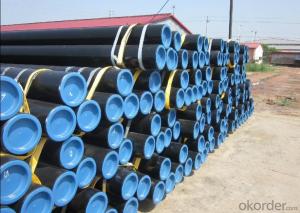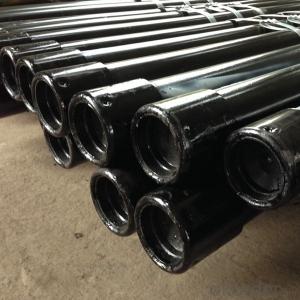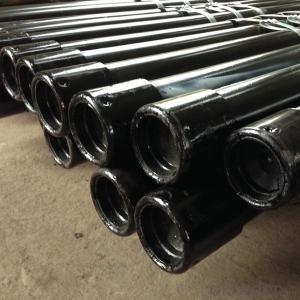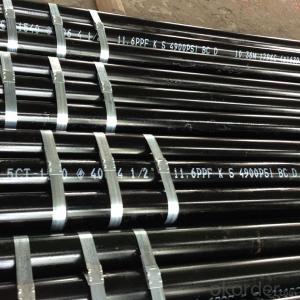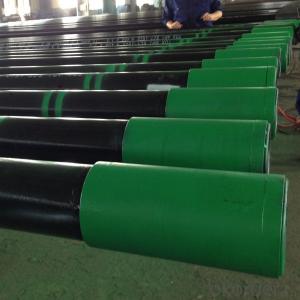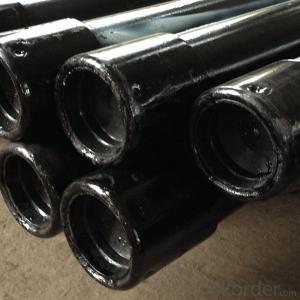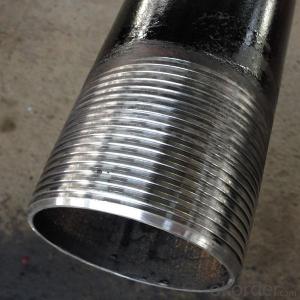api 5ct n80 seamless casing pipe length:r1 r2 r3
- Loading Port:
- Shanghai
- Payment Terms:
- TT OR LC
- Min Order Qty:
- 10 m.t.
- Supply Capability:
- 100000 m.t./month
OKorder Service Pledge
Quality Product, Order Online Tracking, Timely Delivery
OKorder Financial Service
Credit Rating, Credit Services, Credit Purchasing
You Might Also Like
api 5ct n80 seamless casing pipe length:r1 r2 r3
1)Standard: AISI,ASTM,GB,DIN,JIS
2)Length:5.8-20m
3)Thickness: 3mm---40mm
4)Diameter: 33.4mm—610mm
5)Application: Oil Pipe
6)Technique: Hot Rolled
7)Packing: export standard
8)Delivery time: 30 days
9)Payment: By T/T or L/C at sight
10)ISO and API certificate
We will supply you good quality and reasonable price and first-class service in China as hope to be your golden supplier.
- Q: How does the price of steel pipes vary based on size and grade?
- The price of steel pipes tends to vary based on their size and grade. Generally, larger pipes and higher-grade steel tend to have higher prices due to the increased raw material and manufacturing costs involved. However, market demand and supply dynamics can also play a role in the price fluctuations.
- Q: How are steel pipes used in the manufacturing of scaffolding?
- Steel pipes are commonly used in the manufacturing of scaffolding as they provide structural support and stability. These pipes are used to create the framework of the scaffolding structure, allowing workers to safely access and work at heights. The steel pipes are connected and secured together using couplers, providing a strong and reliable base for the scaffolding system.
- Q: Can steel pipes be used for gas transportation?
- Yes, steel pipes can be used for gas transportation. Steel is a commonly used material for gas pipelines due to its strength, durability, and resistance to corrosion. Steel pipes are able to withstand high pressures and are suitable for transporting both natural gas and propane. They are also capable of withstanding extreme temperatures, making them ideal for gas transportation in various environments. Additionally, steel pipes can be welded together, allowing for a seamless and continuous pipeline system. However, it is important to ensure that the steel pipes used for gas transportation are properly coated and protected against corrosion to prevent any leaks or damage to the pipeline.
- Q: Why seamless steel pipe called seamless steel pipe?
- Steel pipe is divided into seamless steel pipe and welded steel pipe two kinds: seamless steel pipe is ingot or tube billet, through the perforation made capillary, and then by hot rolling, cold rolling or cold drawn made, so seamless steel pipe is divided into hot-rolled and cold drawn two categories. Welded steel pipe is through the steel plate or steel strip after bending forming, and then welded to make, according to the form of weld is divided into longitudinal welded pipe and spiral welded pipe two kinds. It is obvious that seamless welded pipe has no weld and that welded steel pipe has weld line.
- Q: How are steel pipes used in the manufacturing of boilers?
- Due to their strength, durability, and heat-resistant properties, steel pipes are essential components in the manufacturing of boilers. Boilers are utilized in various industrial and commercial applications to generate steam or heat water. The construction of boiler tubes is where steel pipes are primarily employed, as they function as the main heat transfer medium. Considering the high temperatures and pressure that these tubes are subjected to, it is crucial to use a material that can withstand such extreme conditions. Steel, with its excellent mechanical properties and corrosion resistance, is the ideal choice for this purpose. To create the boiler tubes, the manufacturing process involves shaping and sizing the steel pipes accordingly. These tubes are then connected to form a network of channels through which hot gases or water can flow. Depending on the boiler design requirements, the steel pipes utilized in this process are often seamless or welded. For the safety and efficiency of the system, the steel pipes used in boilers must meet stringent quality standards. They are subjected to tests to ensure their ability to withstand high pressure, temperature, and corrosion. Furthermore, inspections and tests such as ultrasonic testing and radiographic examination are conducted to identify any defects or flaws that might compromise the performance of the boiler. In conclusion, steel pipes play a critical role in the manufacturing of boilers by serving as the primary material for boiler tubes. Their strength, durability, and heat-resistant properties make them suitable for enduring high temperatures and pressure. These pipes undergo rigorous testing to guarantee their quality and reliability in creating efficient and safe boiler systems.
- Q: What industries typically use steel pipes?
- Steel pipes find widespread use across various industries due to their durability, strength, and versatility. Some of the sectors that typically employ steel pipes include: 1. Construction: Steel pipes are extensively utilized in the construction industry for diverse purposes like structural support, plumbing, and underground piping systems. They are commonly seen in commercial buildings, residential structures, bridges, and tunnels. 2. Oil and gas: The oil and gas industry heavily relies on steel pipes for drilling, transporting, and distributing oil and gas. Steel pipes are employed in offshore drilling rigs, oil refineries, natural gas processing plants, and pipelines to ensure the safe and efficient transport of these valuable resources. 3. Water and wastewater: Steel pipes play a crucial role in providing clean water supply and managing wastewater. They are used in water treatment plants, desalination facilities, and municipal water distribution systems. Steel pipes are also essential for sewage and stormwater management. 4. Manufacturing: Various manufacturing industries employ steel pipes for specific applications. For example, automobile manufacturers use steel pipes in exhaust systems, fuel lines, and hydraulic systems. Steel pipes are also utilized in the production of machinery, equipment, and appliances. 5. Mining: The mining industry requires robust and enduring materials for its operations. Steel pipes are used in mining applications such as conveying materials, ventilation systems, and underground infrastructure. They prove particularly useful in transporting minerals, ores, and other mining byproducts. 6. Energy and power: Steel pipes find extensive use in power generation facilities, including thermal power plants, nuclear power plants, and renewable energy installations. They are employed in steam pipelines, cooling systems, and heat exchangers. Steel pipes are also used in the construction of transmission lines for electricity distribution. 7. Infrastructure and transportation: Steel pipes are essential for infrastructure development and transportation systems. They are used in the construction of roads, bridges, railways, and airports. Steel pipes also play a role in the transportation of fluids and gases, such as in natural gas or petroleum product pipelines. Overall, the versatility and dependability of steel pipes make them indispensable in a wide range of industries, contributing to various aspects of our modern infrastructure and daily lives.
- Q: Galvanized steel pipe in addition to good rust resistance, what are the advantages?
- Galvanized steel is cracking for 39 days and will not, especially suitable for Northern very cold environment.
- Q: Can steel pipes be used for the construction of dams?
- Yes, steel pipes can be used for the construction of dams. Steel pipes are often used in dam construction for various purposes such as water intake and outlet structures, penstocks, and spillway gates. They offer durability, strength, and resistance to corrosion, making them suitable for withstanding the high pressures and harsh environments associated with dam construction.
- Q: What are the different types of supports used for underground steel pipes?
- There are several types of supports commonly used for underground steel pipes, including concrete cradles, saddle supports, and thrust blocks. These supports help distribute the weight and forces acting on the pipe, ensuring its stability and preventing damage.
- Q: What are the applications of stainless steel pipes?
- Stainless steel pipes have a wide range of applications in various industries. They are commonly used in plumbing systems, oil and gas transportation, chemical processing, food and beverage production, and pharmaceutical applications. These pipes offer excellent resistance to corrosion, high strength, and durability, making them suitable for environments that require hygienic conditions, high pressure, or extreme temperatures. Additionally, they are often used for structural purposes, such as in construction and architectural projects.
Send your message to us
api 5ct n80 seamless casing pipe length:r1 r2 r3
- Loading Port:
- Shanghai
- Payment Terms:
- TT OR LC
- Min Order Qty:
- 10 m.t.
- Supply Capability:
- 100000 m.t./month
OKorder Service Pledge
Quality Product, Order Online Tracking, Timely Delivery
OKorder Financial Service
Credit Rating, Credit Services, Credit Purchasing
Similar products
Hot products
Hot Searches
Related keywords
